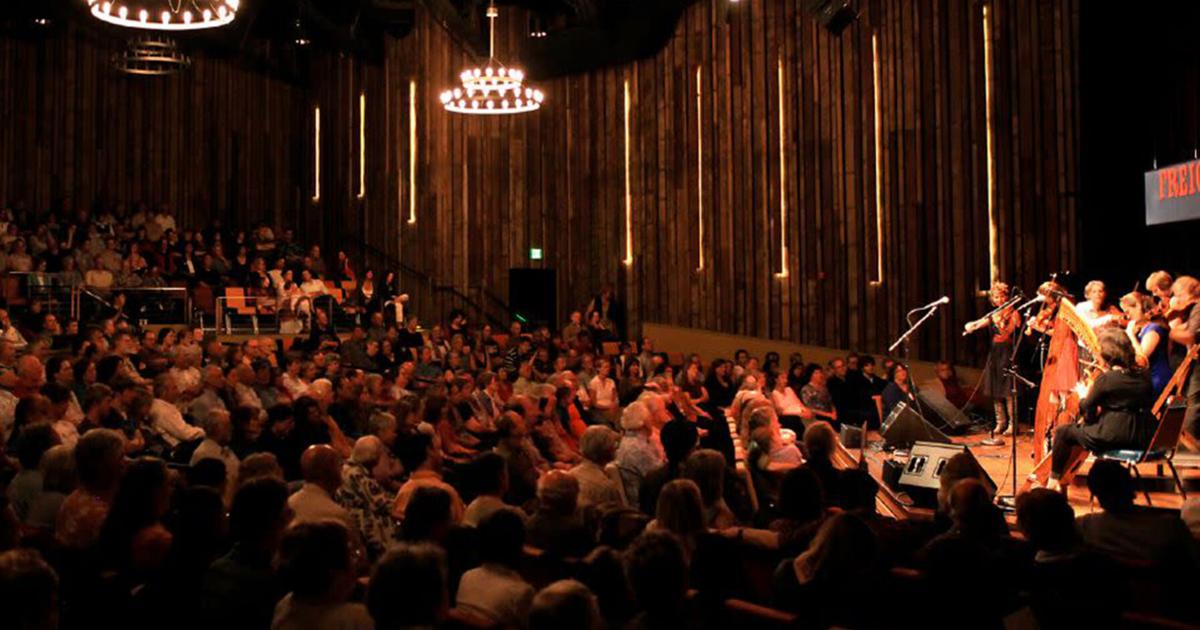Tucked away in Downtown Berkeley, The Black Women’s Roots Festival is an immersive hidden gem, radiating life and community from the moment you step into the doors of The Freight. The atmosphere evoked a sense of home and belonging, as everyone greeted one another with warmth and familiarity. Strangers greeted one another like old friends, and longtime community members who truly knew each other for years had nothing but open arms. Even before the festival had formally begun, it was clear this gathering was more than just for music; it felt deeply necessary, like a homecoming, with The Freight simply serving as the stage.
The show opened intentionally with the powerful Black National Anthem, “Lift Every Voice and Sing,” performed by Miss Faye’s Babies. As we all rose to our feet, the moment — founded on true honor and respect of Black history and culture — felt profound, which is especially poignant in today’s political climate.
Through the School of the Getdown, which she founded to support young musicians in the Bay Area, Miss Faye Carol’s impact on the local root music community was unmistakable. Shaping local musicianship, hers and the many other artists’ performances became a testament to the enduring influence that Black musicians have on shaping genres, celebrating this ongoing cultural impact.
The performances honored the roots and richness of Black culture, blending a set list of iconic songs in Black culture with original compositions from the present artists. Poems such as “We Rise,” for example, reminded everyone that Black women “are not victims” but “victors.” What struck me most throughout the event was its seamless, beautiful intertwining of faith and culture. The festival seemed devoted not only to thanking God, but also to centering that gratitude as the driving force behind honoring the Black women mentors who have connected generations and embodied legacy, guidance and shared success. It was a true reminder that Black womanhood and its inherent, resilient femininity is a generational trait that’s rooted in wisdom and a prioritization of collectivity over individuality. Stylish, intricate and anointed, all creatives involved in this production were incredible, with nothing being done in vain. The whole event felt like one big jam session, alive with spontaneity and soul.
Blending together a deep understanding of jazz with the modern influence of hip-hop, Big Gems Daughter took center stage as the set moved from classic to contemporary sounds. After discussing the cultural empowerment integral to her work, she performed her song “It’s Really Black Music.” As lyrics such as “It’s really Black music / But they call it rock” rang out to the crowd, her performance encouraged audience members to reflect on the bountiful contribution that Black artists have given to the world of music. While other roots artists, such as Miko Marks — a primarily folk and blues artist — performed, these commanding musicians transformed the space into a showcase of the constant evolution that Black artists drive within music.
While the night continued, artists such as Dee Dee Simon graced the stage with her striking vocals, inspiring many to take to the aisles and dance to her rendition of “I’m Every Woman” by Chaka Khan. Bishop Yvette Flunder, an inspirational powerhouse vocalist, took everyone in attendance to church as her soulful gospel got the entire crowd singing as a united choir. With another standout performance from Linda Tillery, every artist fully embodied the cultural significance that Black women artists have supplied music.
Despite the intimate crowd size, the artists gave each performance their all, closing the gap between stage and audience in a symbiotic exchange of energy, art and appreciation. Everyone was engaged: clapping, dancing in their seats, smiling and singing back as if in conversation with the music. The festival was more than a source of entertainment — it was a medium of empowerment, a space of affirmation, and a true celebration of Black womanhood in all its forms.

